Educating from the Inside Out in Thailand
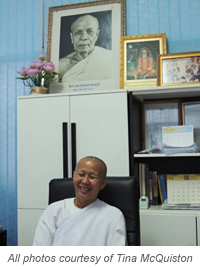
Acharn Yai (Aunampai Passakchai), Buddhist Nun, Talks About Meditation, Academics and Peace
(Part one of a three-part series)
I was deeply moved while writing two previous blog posts about the Dhammajarinee Witthaya School, which provides 500 at-risk girls in Thailand a free education. So when I took a short trip to Bangkok last month, at the top of my wish list was a side trip to Ratchaburi Province to tour the school and meet Acharn Yai, the extraordinary Buddhist nun who is the headmaster of the school.
At the Dhammajarinee Witthaya School, 400 students practice the Transcendental Meditation technique together each day. For Acharn Yai (translated as “headmaster teacher”), TM is not only a way to help girls with a history of extreme poverty, broken homes and domestic violence to find their way to a successful and happy life, but it’s a way to create peace for the entire country.
Visiting the school in person was much more impressive than writing about it from a distance. The buildings and grounds were light-filled, clean, spacious. We were greeted by several teachers with a traditional Thai greeting of “Swasdeeka” and trays of Thai sweets artfully wrapped in banana leaves. After refreshments, we were invited into an air-conditioned office where Acharn Yai took time from her busy day to answer questions. I was deeply moved by Acharn Yai’s warmth, her beautiful heart and her love and compassion for the girls at the school.
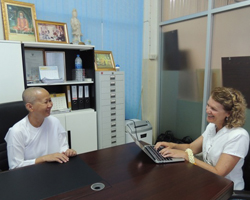
Linda Egenes: How has the TM technique helped girls to learn?
Acharn Yai: What has helped these girls the most is growing in consciousness. Normally people focus on physical development, development of the body, and they forget consciousness, the inner life.
In order to grow in wholeness, a full life, the students need to develop both the consciousness and the body together. For growth of consciousness, they learn the TM technique.
Linda Egenes: What do you do to help the children grow strong physically?
Acharn Yai: For the body, we give them proper food of all five food groups, with plenty of vitamins, minerals, proteins and healthy fats. We also make sure they have time to exercise every day. We provide a safe, secure and beautiful environment for them to live in.
Every morning the nuns who live here go out to the village to beg for food. This is not the traditional way for nuns in Thailand to find food to eat, but we need extra food to feed the growing girls.
Yet there is not enough food from begging to feed all the girls! So we have a kitchen and a cook to prepare meals for the students. We buy some food, such as chicken and fish, and the girls grow organic vegetables and mushrooms and harvest the fruits from the banana and coconut trees. Other girls help cook, and others keep the lawn mowed and the grounds and buildings tidy. Each girl has a job in addition to their academic studies.
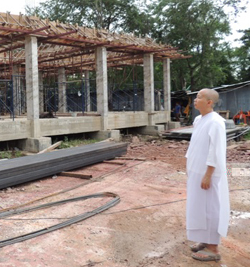
Linda Egenes: How have the children changed since they started meditating at the school in 2009?
Acharn Yai: Most of the girls have come from a rough or problematic background. Their families were unable to care for them properly, due to divorce, extreme poverty, domestic violence, or neglect. So these children are so delicate in heart and mind. After they begin the practice of meditation, their minds become stronger. When they are more strong and stable inside, whatever they do will be more successful. TM is just like a medicine to cure and nourish and uplift them and help them become better students and people.
Linda Egenes: Have the students grown in academic achievement since you introduced the TM technique to the school?
Acharn Yai: In the first years of the school, before we introduced Transcendental Meditation, the teachers never took the girls to competitions with other schools because they were not ready. Some girls were so tough they would make the teachers cry, made their friends cry. We had to replace the teachers every month because they did not want to stay.
Now, since adding TM to the curriculum in 2009, the girls not only attend all government competitions, but they win prizes.
Last week some of the girls attended a Mind Map Competition—a national competition for creative thinking and drawing skills. One of our students won first prize for the primary level (Grades 4, 5 and 6) for the entire nation. They were asked to draw “My Happiness.” She drew the parts of her day that made her happy—such as taking a shower and eating sweets. The judges felt that she expressed her inner feelings, and that’s why she won the first prize.
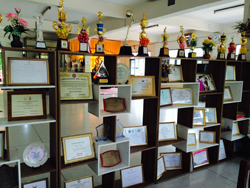
For the secondary school level (Grades 7, 8, 9), a team of our students won the second prize for Mind Map Competition and also second prize for the Memory Competition.
In fact, out of all the public government-run schools in this province, our school is now considered the top school for academics of all kinds. This has only been possible since we started teaching the girls the Transcendental Meditation technique and the advanced TM-Sidhi program.
Linda Egenes: I know that you were adding on grades as the children grew up, and now for two years you have offered all 12 grades. How many of your graduates are going on to higher education?
Acharn Yai: Out of the 25 who finished grade 12 last year, 22 continued on to college and three went back to their villages to work. A donor has contributed to a special fund so the students can receive scholarships if they wish to go to college.
Linda Egenes: How does TM help the intellectual development of students?
Acharn Yai: Transcendental Meditation helps the children become more calm, more peaceful, more intelligent, and more focused on their studies.
As Maharishi said, there is so much knowledge to learn, it is infinite. What students need is to develop their consciousness by practicing TM. Then they expand their minds, the container of knowledge, and expand their capacity to learn more and more.
Linda Egenes: And moral development—does that also grow?
Acharn Yai: When the students practice TM, their consciousness become more pure, more good. Naturally their behavior, whatever they do, is good. That’s the direct consequence of meditating.
Because of their backgrounds, most of the girls, when they first come, are angry and sad. This gets expressed in rough behavior. They may fight the other girls or act aggressive. After they start meditating, they become more soft, more kind. After they meditate they become happy and find life is more fun.
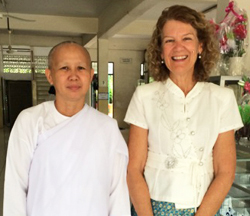
Linda Egenes: How does the TM technique fit in with Buddhist education?
Acharn Yai: By practicing TM, it makes us understand the Buddhist religion more deeply. Between TM and Buddhism there is no conflict. Lord Buddha taught us to do good, to not do non-good, and to make our hearts and minds pure. Doing TM, your consciousness becomes more pure so it’s very much in accord with what Lord Buddha taught so there’s no conflict at all. And when the students meditate more and more, they are more and more peaceful so they can understand the teaching of Lord Buddha better. It’s easier for them to be good.
When you meditate you contact pure consciousness, then naturally your thinking, your action and speech are good and you don’t do any harm to anyone. You don’t have to force yourself. When you have good consciousness it would hard for you to do anything that is not good. When you have a pure heart then non-good will not happen.
Linda Egenes: What do you see as the future for your school and what is it that you need to reach that future?
Acharn Yai: I would like to have 1000 students meditating together and doing the advanced meditation program of the TM-Sidhis together. That will create peace and happiness not only for these students, but for all of Thailand. That’s why we are building a bigger dormitory, so we can enroll more students.
Linda Egenes: Why do you feel that education is important for every mother, every woman in Thailand and the world?
Acharn Yai: Education is the root of life. Through education you can have the knowledge to support yourself and your family in this world, to earn a living. But even more, real education provides the proper knowledge to live a full life. It helps you to develop your inner consciousness so you can bring peace and happiness to yourself and everyone around you.
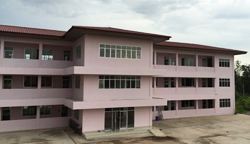
Linda Egenes: How do you feel that the TM technique can help women around the globe, to realize their full potential?
Acharn Yai: If we practice Transcendental Meditation we will have inner happiness. We will have more strength. We will be more calm and peaceful.
When we are more peaceful we have clear vision. Then if a problem arises in life, we can see clearly what is the cause and how to solve the problem properly.
If you don’t meditate, when a problem arises, you tend to keep repeating the problem, and you can’t solve the problem as easily. Some people will run away from a problem and continue to run. But if you don’t solve the problem it will just keep following you!
That’s why it’s important to have a peaceful mind so you can see the source of the problem and solve it properly.
During the past two years, Acharn Yai and supporters have raised funds and completed a new classroom building. Now the school is raising funds for a new dormitory building that will allow the school to expand from 500 to 1000 students. Tax-deductible donations for the school can be made at http://www.seedsofheaven.org/donate.html. When donating, be sure to click the button for Dhammajarinee Witthaya School in Thailand. Or you may donate directly to the school here: http://www.buddhistgirls.org/eng/donate.html
Full 13 Minute Video
About the Author
Linda Egenes writes about green and healthy living and is the author of six books, including The Ramayana: A New Retelling of Valmiki’s Ancient Epic—Complete and Comprehensive, co-authored with Kumuda Reddy, M.D.
More Posts by Linda
- Tired and Burned Out? Transcendental Meditation Can Help: An Interview with Dr. Nancy Lonsdorf, MD
- Worried About the Future? Six Ways to Calm Your Anxiety
- What Do You Carry in Your Self-Care Tool Kit?
- Five Strategies for Family Caregivers
- From the Streets to College in Four Months: The Communiversity of South Africa Empowers Underserved Youth in Cape Town





